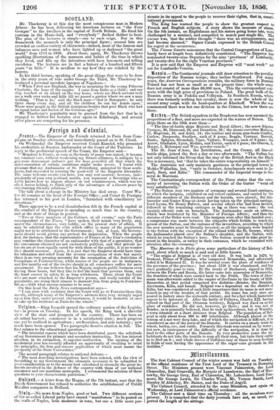SCOTLAND.
Mr. Thackeray is at this day the most conspicuous man in Modern Athens : he has been delivering his American lectures on " the Four Georges" to the dwellers in the capital of North Britain. He fixed his rostrum in .the Music-hall, and " everybody " flocked thither to hear. The plan of the lectures is simple—one to each reign. But in this framework the monarch is only the principal figure ; around him are crowded an endless variety of characters—indeed, most of the famous and infamous men and women who have lighted up or darkened "the great world " from 1715 to 1830. About these, again, Mr. Thackeray throws sparkling illustrations of the manners and habits of the time in which they lived, and fills up the interstices with keen bon-mots and telling anecdotes. The lectures are in fact a history of a hundred and fifteen years "in little." It is needless to say how they are relished by the hearers.
In his third lecture, speaking of the great things that were to be done in the sixty years of rule under George the Third, Mr. Thackeray in- troduced a personal anecdote apropos of Napoleon- " When I first saw England, she was in mourning for the young Princess Charlotte, the hope of the empire. I came from India as a child ; and our ship touched at an island on the way home, where my Black servant took me a walk over rocks and hills till we passed a garden where we saw a man walking. That is he ' said the Black man= that is Bonaparte : he eats three sheep every dai, and all the children he can lay hands upon.' i There were people in the British dominions besides that poor Black who had an equal terror and horror of the Corsican ogre."
Mr. Thackeray's popularity may be guessed from the fact that he is engaged to deliver his lectures over again in Edinburgh, and several other places are competing for his presence.


























 Previous page
Previous page